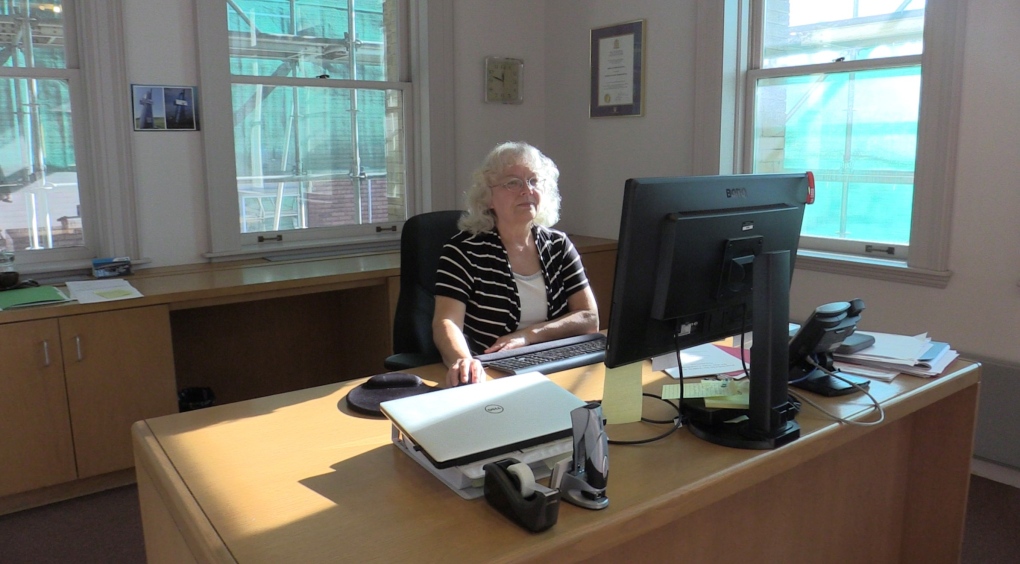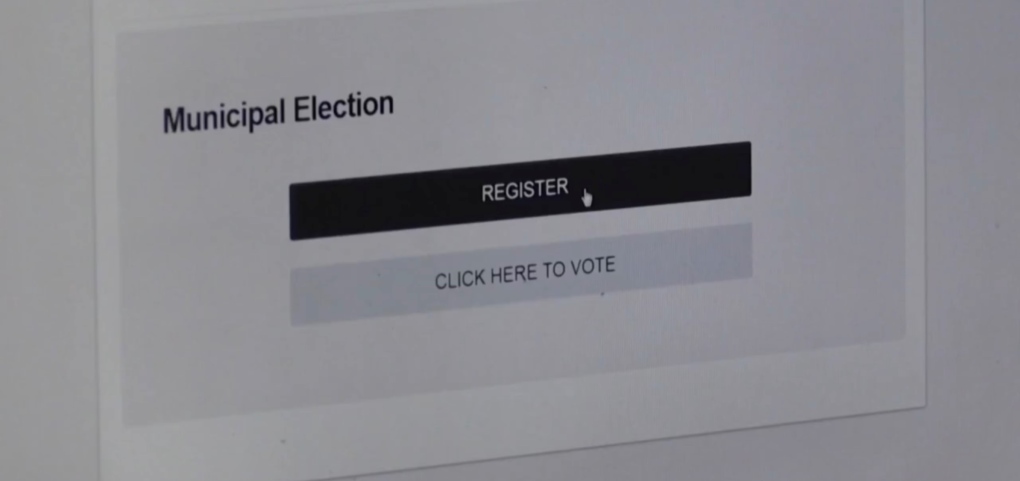St. Thomas, Ont. to move to only electronic voting in 2022 Election
The city of St. Thomas, Ont. will abandon in-person voting for the Oct. 2022 municipal election.
"Using internet and telephone voting will allow our electors to vote anywhere from anywhere 24 hours a day at their convenience," said Maria Konefal, St. Thomas' city clerk and returning officer.
During the 2018 municipal election, St. Thomas used a hybrid voting system. During the advanced poll voters could only cast ballots by phone or internet. On Election Day, only in-person votes were allowed.
A total of 10, 218 electors voted with 55.7 per cent by paper ballot, 41.1 per cent via internet, and 3.1 per cent by phone. Voter turnout was 35.9 per cent. Maria Konefal, St. Thomas, Ont. Clerk and Election Returning Officer, Nov. 16, 2021. (Brent Lale / CTV News)"We think that we've seen from other communities and ours, the use of internet and phone voting will increase the voter turnout," said St. Thomas Mayor, Joe Preston. "We also talked about using some of our more current balloting spots for some kiosks. Rather than voting on your phone from home or your computer, you could go to a public place and someone will be there to help you at the kiosk with the iPad or phone there."
Maria Konefal, St. Thomas, Ont. Clerk and Election Returning Officer, Nov. 16, 2021. (Brent Lale / CTV News)"We think that we've seen from other communities and ours, the use of internet and phone voting will increase the voter turnout," said St. Thomas Mayor, Joe Preston. "We also talked about using some of our more current balloting spots for some kiosks. Rather than voting on your phone from home or your computer, you could go to a public place and someone will be there to help you at the kiosk with the iPad or phone there."
However not everyone believes this is the best practice.
"Convenience is not a principal of the Elections Act," said Aleksander Essex, a Western University professor who specializes in cybersecurity.
"Online voting in Ontario municipalities remains a source of controversy in this province, but also internationally. In the last election, 43 municipalities in Ontario saw the election website go down on election night, and as far as I know, none of them had a backup plan. So they had to invoke emergency powers to extend the voting period."
Despite not having a backup plan in 2018, St. Thomas wasn't one of the 43 municipalities to have internet issues on election night. Essex also worries that a third-party private company counting ballots could raise controversy about an outcome.
"When you go to like a school or church, you put a piece of paper in a ballot box, and at the end of the night, the deputy returning officer counts it up in front of all the candidate representatives. This is not what's happening here," Essex explained. "Ballots go into a server owned by a private company and then a result comes out which the clerk announces right, and that's just not appropriate for a democratic election. And as we saw in the U.S., you know, you don't even have to have done anything wrong for there to be a controversy about the outcome,” he said. “So what we need to do is get ourselves to a place where we actually can defend the election outcomes and that they are robust against, you know, conspiracy theories or genuine concerns raised by losing candidates."
"Ballots go into a server owned by a private company and then a result comes out which the clerk announces right, and that's just not appropriate for a democratic election. And as we saw in the U.S., you know, you don't even have to have done anything wrong for there to be a controversy about the outcome,” he said. “So what we need to do is get ourselves to a place where we actually can defend the election outcomes and that they are robust against, you know, conspiracy theories or genuine concerns raised by losing candidates."
Mayor Preston isn't concerned, saying, "The people who run the system tell us we have no worries. We ran it for all our advanced poll and almost half the votes that came in last time, came in electronically or in a phone system, so we're going to take it all the way."
The new format will also result in a small savings. Konefal says they will save money on equipment, voting tabulators used for paper ballots have surpassed their lifespan and will no longer be required.
"We won't have to pay maintenance or purchase new ones," said Konefal. "We'll save approximately $16,000 for this upcoming election because we would still be able to use the tabulators. For any future election we would have to incur a cost of at least $40,000 for new tabulators and then a slight decrease in costs, should we have chosen a vote by mail option because for that particular option we would have to use more staff in order to count ballots the evening of the actual election."
CTVNews.ca Top Stories

Labour minister unveils steps to end Canada Post strike
Canada Post workers began their strike four weeks ago, halting mail and package deliveries across the country. Labour Minister Steven MacKinnon said he hopes work will resume as early as next week.
BREAKING Ottawa to remove 30% investment cap for Canadian pension funds
Finance Minister Chrystia Freeland says the upcoming fall economic statement on Monday will remove the cap that currently restricts Canadian pension funds from owning more than 30 per cent of the voting shares of a Canadian entity.
Canada's homicide rate down in most provinces, with 2 exceptions
The homicide rate is declining in Canada, and the country’s three largest cities all saw double-digit percentage decreases in homicides per capita, according to data released this week.
Top musician forced to cancel Toronto concert after Air Canada refused to give his priceless cello a seat on plane
Famed British cellist Sheku Kanneh-Mason, who became a household name after performing at the wedding of Prince Harry and Meghan Markle, has said he had to cancel a concert in Canada after the country’s largest airline denied his pre-booked seat for his cello.
Eight people injured after horse-drawn wagon went out of control in eastern Ont.
Eight people were injured after horses became out of control while a man was offering a horse-drawn wagon ride Thursday in eastern Ontario, according to the Brockville Police Service.
Buckingham Palace maid arrested after drunken brawl at work Christmas party
Buckingham Palace is investigating after a member of staff was arrested at the end of a rowdy Christmas party.
'If they believe in diplomacy, good luck': Doug Ford doubles down on energy threat as some premiers distance themselves
Doug Ford is standing behind his threat to stop providing the U.S. with electricity in response to president-elect Donald Trump’s promised tariffs, even as several other premiers publicly distance themselves from the stance.
Will your Christmas gifts arrive on time? Here's what the labour minister had to say
The Canada Post labour dispute has now passed the four-week mark, and as Christmas draws near, some may be anxious about delayed or cancelled shipments affecting their holiday shopping.
4 people injured after car crashes into bus shelter in Longueuil
Four people were sent to hospital after a car crashed into a bus shelter in Longueuil Friday morning.





























